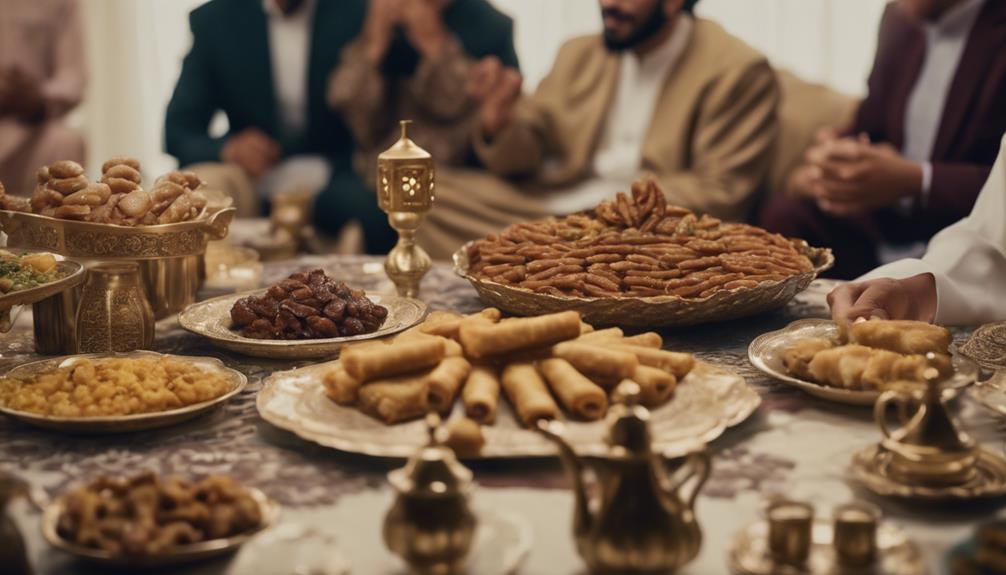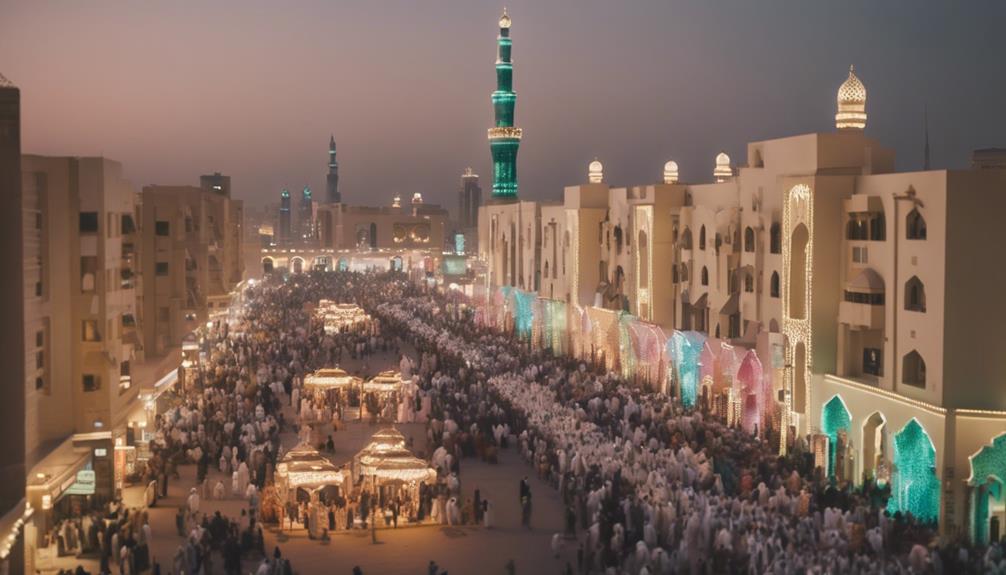As the sacred month of Ramadan approaches in 2024, understanding the nuances of observing this important time in Saudi Arabia is crucial. From the length of fasting hours to the intricacies of prayer times and mosque etiquette, there are essential aspects to be mindful of.
Cultural traditions, healthy eating tips, and community events further enrich the experience. Navigating these elements with grace and respect can significantly enhance one's connection to the spiritual essence of Ramadan in the Kingdom.
Beyond the surface, uncovering the subtleties of observance can lead to a more meaningful and fulfilling Ramadan experience in Saudi Arabia.
Fasting Hours in Saudi Arabia

The duration of fasting hours in Saudi Arabia during Ramadan 2024 is subject to variations based on the geographical location and time of year. With fasting typically lasting from dawn till sunset, individuals in Saudi Arabia may experience varying fasting durations throughout the holy month. It is crucial for individuals observing Ramadan to prioritize hydration during non-fasting hours to maintain optimal health and well-being.
During Ramadan, individuals in Saudi Arabia may experience fluctuations in work productivity and energy levels due to the changes in their daily routine. Employers and employees alike should be mindful of these potential impacts and consider adjusting work schedules or tasks to accommodate the needs of fasting individuals. By promoting a supportive and understanding work environment, organizations can help employees navigate the challenges of fasting while maintaining their productivity levels.
Balancing fasting requirements with work commitments is essential during Ramadan in Saudi Arabia. Prioritizing hydration and managing energy levels effectively can contribute to a successful and fulfilling observance of this sacred month.
Prayer Times and Mosque Etiquette
Amid the observance of Ramadan in Saudi Arabia, adherents must adhere to designated prayer times and observe proper etiquette when visiting mosques. Mosque attire plays a crucial role in demonstrating respect for the sacred space. Men are typically required to wear ankle-length pants and shirts with sleeves, while women are expected to dress modestly, covering their hair with a headscarf and wearing loose-fitting clothing that conceals the body.
When entering a mosque, it is essential to remove your shoes before stepping onto the carpeted prayer area. Upon arrival, it is customary to perform ablution (wudu) before engaging in prayer. During congregational prayers, it is important to maintain focus and avoid unnecessary movements. It is also customary to refrain from passing in front of someone who is praying. Additionally, electronic devices should be turned off or switched to silent mode to minimize distractions. By observing these practices and demonstrating proper mosque etiquette, individuals can enhance their spiritual experience during Ramadan.
Cultural Traditions and Customs

In Saudi Arabia during Ramadan, cultural traditions and customs play a significant role in shaping the observance of this holy month. Traditional clothing holds immense importance during this period, with many Saudis choosing to wear their traditional attire, such as the thobe for men and the abaya for women, to display respect for the sanctity of the month.
Social gatherings are also a key feature of Ramadan in Saudi Arabia. Families and friends often come together to break their fast, known as iftar, in a spirit of togetherness and community. These gatherings provide a time for strengthening relationships and fostering a sense of unity among individuals.
Moreover, during Ramadan, there is a heightened sense of charity and giving. Many Saudi families participate in charitable activities, such as providing meals for the less fortunate or donating to various causes, embodying the spirit of generosity that is central to the month of fasting. These cultural traditions and customs not only enrich the observance of Ramadan but also reflect the values of compassion and unity within Saudi society.
Healthy Eating Tips for Ramadan
Opting for nutrient-rich foods and mindful portion control can support a balanced diet during Ramadan. Maintaining nutritional balance is crucial during this holy month. Meal planning becomes essential to ensure that the body receives adequate nutrients for sustained energy throughout the fasting period. Including a variety of food groups such as fruits, vegetables, whole grains, lean proteins, and healthy fats can help achieve this balance.
Hydration is key during Ramadan, especially in the hot climate of Saudi Arabia. It is important to drink plenty of water during non-fasting hours to prevent dehydration. Including hydrating foods such as watermelon, cucumbers, and soups in suhoor (pre-dawn meal) can also aid in maintaining fluid levels throughout the day. Additionally, incorporating electrolyte-rich drinks can help replenish minerals lost during fasting.
Strategic suhoor planning involves consuming complex carbohydrates and proteins to sustain energy levels throughout the day. Avoiding sugary foods and caffeine can help prevent energy crashes later on. By focusing on nutrient-dense foods and staying hydrated, individuals can ensure a healthy and balanced Ramadan diet.
Community Events and Celebrations

During Ramadan in Saudi Arabia, community events and celebrations play a significant role in bringing people together to mark this special time of spiritual reflection and devotion. The month is characterized by a vibrant array of social gatherings that create a festive atmosphere across the country. These events provide opportunities for individuals to come together, share meals, and strengthen bonds within the community.
Moreover, Ramadan in Saudi Arabia is a time for charitable initiatives and community outreach. Many organizations and individuals organize activities such as distributing food packages to those in need, hosting charity drives, and arranging iftar meals for the less fortunate. These initiatives not only embody the spirit of giving and compassion central to Ramadan but also foster a sense of unity and solidarity among community members.
Frequently Asked Questions
What Are Some Common Greetings or Phrases That Are Used During Ramadan in Saudi Arabia?
During Ramadan in Saudi Arabia, common greetings and phrases reflect the Ramadan etiquette and cultural expressions prevalent in the region. These include "Ramadan Mubarak" (Blessed Ramadan) and "Siyam Maqbul" (May your fasting be accepted).
Are There Any Specific Rules or Guidelines Regarding Social Gatherings During Ramadan in Saudi Arabia?
During Ramadan in Saudi Arabia, social gatherings are common but should adhere to cultural norms and religious customs. Respectful behavior, modest attire, and avoiding public displays of affection are expected. Community engagement through charitable activities is encouraged.
How Do Saudi Arabian Families Typically Prepare for the End of Ramadan and the Celebration of Eid Al-Fitr?
Saudi Arabian families typically prepare for the end of Ramadan and the celebration of Eid al-Fitr by engaging in various family traditions like decorating homes, shopping for new clothes, preparing special meals, and exchanging gifts.
Are There Any Traditional Ramadan Desserts or Dishes That Are Unique to Saudi Arabia?
Saudi Arabian culinary traditions during Ramadan often showcase a variety of unique desserts and dishes. Traditional pastries like kunafa and qatayef are popular choices, alongside cultural sweets such as maamoul and baklava, enriching the festive spirit.
How Do Saudi Arabians Typically Give Back to Their Community or Those in Need During Ramadan?
During Ramadan, Saudi Arabians engage in various community initiatives like charity events, volunteer opportunities, and donation drives. These endeavors aim to support those in need, foster unity, and embody the spirit of giving back to society.
Conclusion
In conclusion, observing Ramadan in Saudi Arabia requires adherence to fasting hours, prayer times, and cultural traditions.
It is important to follow mosque etiquette, maintain healthy eating habits, and participate in community events and celebrations.
By respecting these practices and customs, individuals can fully immerse themselves in the spiritual and communal aspects of this holy month.

